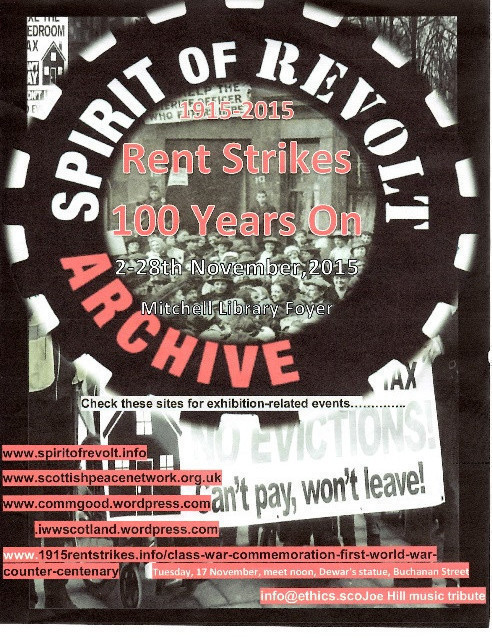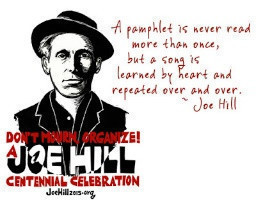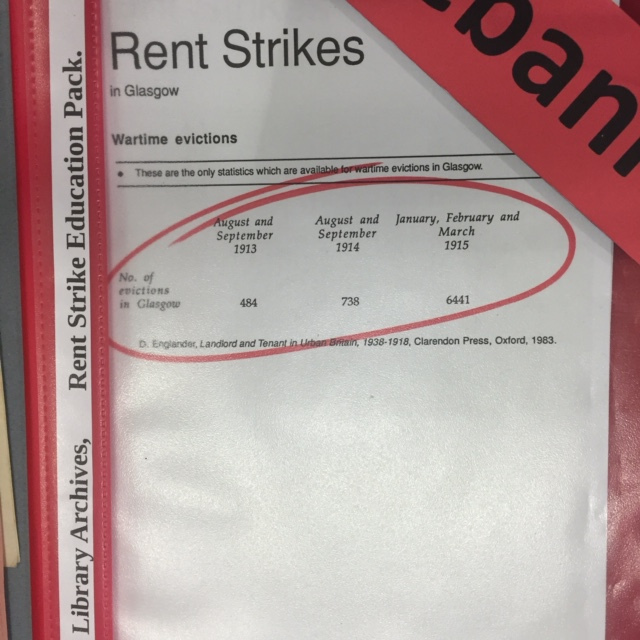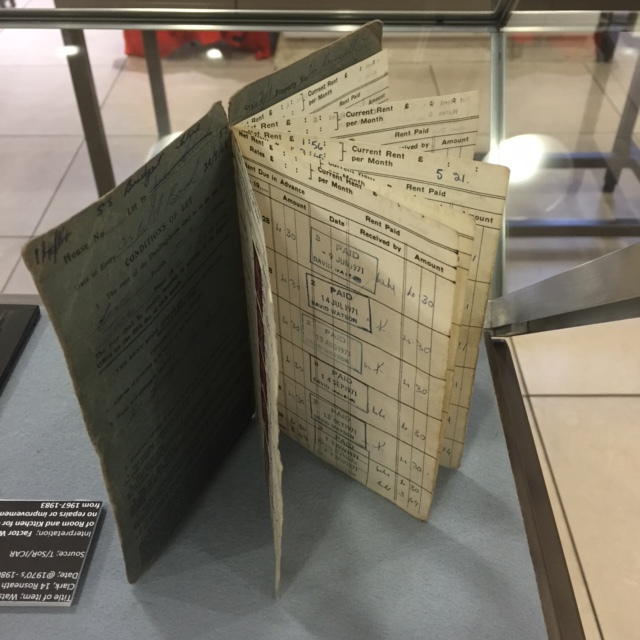Rent Strikes, 100 Years On,
2-28th November 2015, Mitchell Library Foyer, Glasgow.

This exhibition organised by Spirit of Revolt ran for the month of November and coincided with the centenary of the death of Joe Hill as well as UK media saturation with WW1 Remembrance shows. We therefore extended the content of the exhibition to include Anti War agitation including mutiny and pacifism and Joe Hill commemoration material from the SoR archive. SoR says the history of the struggles of the ordinary people is seldom fully recorded, but we should never let it be lost, to this end the Spirit of Revolt collects, catalogues and publishes on line, as much of the struggles of the ordinary people of Glasgow and Clydeside, as we can get our hands on. It is our history, our culture of struggle for a better life, if we don’t record it, then it will be lost, and we become a people without a history, a people without a culture.
The exhibition was very well received with comments and feedback are at this link. Across 6 museum glass cases we included material from National Library of Scotland (John Maclean Archive and Screen Archive Hillington) Mitchell Archives Rent Education Pack, Warwick University archives, Clan Donald Lands Trust Archive – Skye and The British Newspaper Archive
Many thanks to those who helped us. Related events included; a Walk of Pride on 17th November creating a rammy with pots, pans, whistles, racquets and banners followed in December by a Joe Hill song night hosted by Ethics Festival. We provided DVD screenings of Red Skirts on Clydeside, the Kirby Rent Strikes- Behind the Landlords and Sylvia Pankhurst. We ran four children’s workshops re-enacting the techniques and solidarity of the Strikers against the sheriff officers as well as a WW1 Conscientious Objectors Poster Session based on the poem The Workers Pledge in Times of War by Guy Aldred. The Exhibition was fully hosted by SoR members each day answering questions from the public, encouraging debate. The items on display included Kropotkin’s research calling for the abolition of rent,to international rent strikes and a lesser known Scottish Rent Strike from 1882 on Skye – The Battle of the Braes – which we deconstructed to demonstrate the similar strategies used 35 years later in Glasgow.  The Exhibition highlights the use of rent strikes across the world as a tool of struggle by people trying to improve or safeguard their Conditions. The success of the UK rent strikes was interlinked with the power of workers to withdraw their labour from the War-drive industries in solidarity with their communities.
The Exhibition highlights the use of rent strikes across the world as a tool of struggle by people trying to improve or safeguard their Conditions. The success of the UK rent strikes was interlinked with the power of workers to withdraw their labour from the War-drive industries in solidarity with their communities. 
The Glasgow 1915 rent strike was a tremendous victory for working class solidarity. It forced the government to bring in the Rent Restriction Act, freezing all rents in the UK until six months after the war. Only by their determined and heroic stand was this achieved. It wasn’t compassion from the landlords, it wasn’t concern for the welfare of the people by the government, it was co-operation and solidarity between the local women of the districts of Clydeside, and the men in the shipyards and factories that brought this struggle to a historic victory. For a more detailed history visit Radical Glasgow’s Strugglepedia
Exhibit Case 1 International
Engels records how The Paris Commune had cancelled all payments of rent for dwelling houses from October 1870 until April 1871. Starting from this ideal this case included Kropotkin’s ‘The Conquest of Bread- Dwellings’ (T SoR3) which explains the reasons for this position;
The Worker “must be housed somehow or other…but who knows what the new Government will do to-morrow? Who can say that it will not call in the aid of force again, and set the police pack upon you to hound you out of your hovels? The case also used a map to demonstrate the global spread of rent striking from Argentina to USA to Soweto. If you have any comments to add, please make them in our contact section.
The Anarchist Peril by Felix Dubois includes cartoons from the period by Pere Pienard which we also included from our T/SoR 3 Cooper collection.
Exhibition Case 2 The Battle of the Braes
Clearances from crofts for profitable sheep farming created disputes across Scotland. Newspaper accounts of the time demonstrate the role of women in this 1882 Rent Strike on Skye where the crofter males were frequently at sea leaving the women and children largely to push the land issues. This dispute over withdrawal of pasture grazing rights led to crofters’ non-payment of rent. The Exhibit deconstructed this Strike into basic elements: women, children, solidarity, petition, deforcement of warrant, blockades, siege, disproportionate force used as intervention against the majority, direct actions drawing parallels with the later Glasgow 1915 strikes.
The Petition showed their earliest tenant challenge to Lord MacDonald, signed by over 45 tenants (scribed in the same hand). He escalated this communication into legal Eviction Notices. Delivery of these warrants to the named crofters in April resulted in direct action against the Sheriff officer. News accounts reported ‘Young lads with flags’ became the lookouts running ahead to rally the demonstrators who lined the path intimidating the Sheriff. Deep blockades surrounded the house so that the warrant could not be delivered. A newspaper account of the later trial describes the angry demonstrators’ use of humiliation to force the Sheriff to burn the warrant amid the shouts and mud throwing. The deforcement of the Warrant by the families resulted in local police seeking reinforcements to re-deliver it sending 50 police, local and from the mainland accompanied by journalists and a gunboat moored offshore. This disproportionate force and dawn raid strategy further escalates the violence of the stand off to a pitched battle of Police against sticks and stones of the crofters. Stones were carried in their aprons and accounts show that 7 of the 10 injured were women. 5 men were arrested and gaoled in Inverness. The media covered the story sympathetically in the bigger cities and solidarity groups became established across the country. A poster advertising a public meeting tries to raise awareness in Glasgow, Gorbals of the issues. The publicity creating public sentiment, remembered in songs and poems and helped the crofters to win land rights securing their own and other crofting tenures through Parliament by 1886.
Exhibition Case 3+4 Glasgow Rent Strike
 In UK 90% of dwellings were rented and in Glasgow the number of evictions rose meteorically between 1913 and 1915 impacting on areas near sources of employment like the shipyards and munitions factories where 14%-23% rent increases were recorded in the first year of the war. [Melling, 1983; 82]
In UK 90% of dwellings were rented and in Glasgow the number of evictions rose meteorically between 1913 and 1915 impacting on areas near sources of employment like the shipyards and munitions factories where 14%-23% rent increases were recorded in the first year of the war. [Melling, 1983; 82]
August to September 1913 –484,
Aug – Sep 1914- 738 and
Feb -March 1915- 6441
Rent Strike! Community Direct Action
John Maclean organised an association around rent issues in 1913 and ILP Housing Cttee with Womens Labour League formed the Glasgow Womens’ Housing association.
 Often depicted as having labour leaders, Melling research cites evidence that the tenants had already decided to oppose their factors collecting support from the 250 houses affected by the increases with the ‘result that almost every man and woman signed the petition against the increases’. Forward 5.6.15-12.6.15
Often depicted as having labour leaders, Melling research cites evidence that the tenants had already decided to oppose their factors collecting support from the 250 houses affected by the increases with the ‘result that almost every man and woman signed the petition against the increases’. Forward 5.6.15-12.6.15
He suggests that ‘local mobilisation and direct personal contact laid the foundations for collective action in a way that general appeal by Labour organisations could not have done’. [Melling, 1983; 64]
This was galvanised by the Women’s Housing Association which included Helen Crawfurd and Mary Barbour and Rent Restriction Committee window poster campaign. Melling describes how the design of the tenement close itself assisted the strikers. Built around common back courts with shared washhouses and neighbour networks, the tenants adopted forced collectivity viewing individual Arrears of Rent Ejectment Notices as common threat reacting in solidarity, marching on their behalf enmass to the courts. As well as housing 6-8 families simply blockading the single front and rear exit creating fortification which made it difficult to serve the warrant itself. Roles were orchestrated with each close having a secretary, street picket lookouts , raising alarms with bells, blockading front and rear entrances with prams, children or demonstrators, noise, verbal and physical intimidation, flour throwing, deforcement of the warrant. Visible solidarity through 20,000+ window poster campaigns reduced the sense of isolation which could weaken the non-payers.
Rent Strike! Workers Solidarity
Tom Bell [Bell 1941; 110] describes the intense industrial agitation from 1910 and how the Singers and Argyll Motor Works Strike Clydebank laid the foundation for over-ruling union leaders who were opposed to mass action, excluded the new machinists in their ‘craft’ memberships and were forever seeking the way of compromise, acting as ‘lightening conductors and running the mass discontent into the ground’. The British Government was concerned about disruption to wartime production and radical threats might slow it down. David Kirkwood in his autobiography describes being shop steward of Parkhead Munition Workers who threatened a ‘most vigorous and extreme reply, and one which might have most disastrous consequences’ if a family was evicted – regarding this as an attack on the working class’, which they duly enacted. Crowds of 20,000 demonstrating outside the court hearings were addressed by John Maclean. That same day 17th November 1915 he received his letter of dismissal from Govan Parish School Board, dismissed following charges under the Defence of the Realm Act 1915 (DORA) and charged with uttering statements calculated to prejudice recruiting for War.
Willie Gallagher describes the impact of the workers leaving the factories on the Judge who was hearing these court cases. He says the Minister for Munitions in London was contacted by phone, Mr. Lloyd George. ‘
The workers have left the factories… they are threatening to pull down Glasgow. What am I to do?’
‘Stop the case… a Rent Restriction Act will be introduced immediately.’
[Gallagher, 1936; 57]
Exhibition Case 5 Peace
The No Conscription Fellowship founded in 1914 was a loose network of militant pacifists and radicals who supported those who resisted conscription. Clifford Allen its chair, was imprisoned as a conscientious objector and as a result of the harsh treatment he received in jail he contracted tuberculosis from which he never recovered. More than 300 soldiers in the British Army were shot by court martial during WW1 most of them for desertion.
Private Harry MacDonald, (shot at dawn) pictured in the display had 3 small children.
The Granite Echo, published by Guy Aldred contained the smuggled out writing of the Conscientious Objectors in the Dyce prison near Aberdeen. Councillor John Wheatley and others wrote against conscription in The Worker– Organ of the Clyde Workers Committee whose offices were raided and closed briefly by Glasgow Police.
War’s Toll was quantified by the IWW in their Solidarity newspaper in the USA citing the differing stands that the I.W.W. and the A.F.L. took during World War I. It was originally used in the trial of the United States vs. William D. Haywood, et al.
Further explored by Dave Lamb in Mutinies 1917-1920
Between 1917 and 1919 a series of mutinies took place amongst the world’s most disciplined armies. The Russian, German, Italian and French forces as well as the British all ‘suffered’ major outbreaks.
Mutiny can be defined as the revolt of men under discipline of death…
The decision to mutiny is not taken lightly…. Mutinies are made by those who decide to mutiny, knowing that they themselves will bear the brunt of what happens.
Exhibition Case 6 Joe Hill Centenary
 Joe Hill was a songwriter, itinerant labourer, and union organiser, convicted him of murder on meagre evidence. Even before the international campaign to have his conviction reversed, however, Joe Hill was well known on picket lines and at workers’ rallies as the author of popular labour songs and as an Industrial Workers of the World (IWW) agitator. Funny and handsome Joe Hill became one of the Wobblies’ leading singers and songwriters composing many of the IWW’s best-loved anthems, including “The Preacher of the Slave” which introduced the phrase “pie in the sky.” By 1915, Hill was one of the most famous Wobblies in the nation, dangerous for a radical union man. Hill was arrested and charged with murdering two Salt Lake City policemen during a grocery store robbery on tenuous evidence. He was executed by firing squad the following year. SoR has a newspaper report of the execution in the TSoR/Dr Gilchrist collection. Hill became a powerful martyr for the IWW cause by telegramming his comrades with a famous last-minute message: “Don’t waste any time in mourning. Organize.”
Joe Hill was a songwriter, itinerant labourer, and union organiser, convicted him of murder on meagre evidence. Even before the international campaign to have his conviction reversed, however, Joe Hill was well known on picket lines and at workers’ rallies as the author of popular labour songs and as an Industrial Workers of the World (IWW) agitator. Funny and handsome Joe Hill became one of the Wobblies’ leading singers and songwriters composing many of the IWW’s best-loved anthems, including “The Preacher of the Slave” which introduced the phrase “pie in the sky.” By 1915, Hill was one of the most famous Wobblies in the nation, dangerous for a radical union man. Hill was arrested and charged with murdering two Salt Lake City policemen during a grocery store robbery on tenuous evidence. He was executed by firing squad the following year. SoR has a newspaper report of the execution in the TSoR/Dr Gilchrist collection. Hill became a powerful martyr for the IWW cause by telegramming his comrades with a famous last-minute message: “Don’t waste any time in mourning. Organize.”
Children and Youth Workshops in schools are available
Youth Workshops on ‘Understanding Solidarity of the Rent Strikes’ were organised by SoR volunteers with the Woodcraft Folk over several weeks full of activities creating artwork, drama, noise and exploring the strategies which helped the Rent Strikes to be so successful. Displays of their work was featured in the Exhibition. This outreach is still available if any schools would like a visit.
Exhibition contents compiled by SoR- Keith M, Eric C, Susan D, S Rice, John Czn, Bob H,
Indispensable SoR Rota Volunteers made the exhibition event happen.
Thanks to National Library of Scotland Archives, Mitchell Archives and Special Collections, Clydeside Press, Jonathan-Clan Donald Archives, Euan S, John Cpr for material.
Associated Events over 2015 – Red Skirts on Clydeside Film Screening – Maria, Document Film Festival, Cayley, Susan D, S.Rice , IWW Clydeside Branch, Scottish Peace Network, Walk of Pride – Susan D. Joe Hill Night -Thank-you to Old Hairdressers Space/Craig Julia, The Only Way is Ethics Festival, Rent Strikes Workshops -Woodcraft Folk Shawlands, Nick S, S. Rice, Bob H, Anti- Militarist Posters Workshops – S.Rice
Booklist for further study
Joseph Melling, 1983, Rent Strikes-Peoples Struggle for Housing in the West of Scotland
Nan Milton, 2002, John Maclean
Kropotkin, 1906, the Conquest of Bread
Felix Dubois, @1894, the Anarchist Peril
Tom Bell, 1941, Pioneering Days
David Kirkwood, 1935, My Life of Revolt
Willie Gallagher, 1936, Revolt on the Clyde
J Bruce Glasier, 1921, William Morris and the Early Days of the Socialist Movement
Dave Lamb, 1977, Mutinies 1917 – 1920
The Island Book Trust, 2011 Aimhreit an Fhearainn, – The Land Struggles in Skye and Lewis
Dr Ann Petrie, 2008, the 1915 Rent Strikes An East Coast Perspective
Ed Ronald Black, 2001, An Lasair, Anthology of 18th Century Scottish Gaelic Verse
Ed Catherine Kerrigan, 1991, An Anthology of Scottish Women Poets
Jonathan Macdonald, Museum Manager, Museum of the Isles, Clan Donald Lands Trust
William M Adler, 2012, the Man Who Never Died, Bloomsbury USA
CD, Music, 1987, Flying Fish, ‘IWW Rebel Voices’
CD Music, 1990, Smithsonian Folkways, ‘Don’t Mourn Organise’
IWW – Little Red Songbook
Film -Red Skirts on Clydeside, 1984, Director Jenny Woodley, Christine Bellamy, Sheffield Film CooP 40.37 minutes
Film -Behind The Rent Strike– Kirby Strike 1972, Director Nick Broomfield, 50 mins,
Film – Sylvia Pankhurst, Worldwrite – 90 minutes ASIN: B004QINSJ2